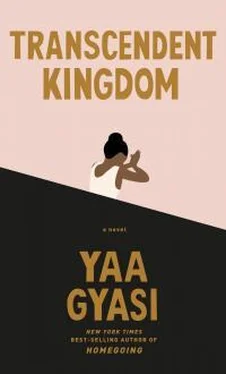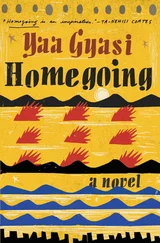I nodded at Katherine. “Doing okay,” I said, and then, to change the subject, “Did I ever tell you that I used to keep a journal when I was young? I’ve been reading it over since my mother got here and I’ve been writing again too.”
“What kind of things are you writing?”
“Observations mostly. Questions. The story of how we got here. It’s embarrassing, but I used to address my journal to God. I grew up evangelical.” I made a kind of jazz-hands motion to accompany the word “evangelical.” When I realized what I was doing, I dropped my hands to my lap as though they were on fire, in need of stubbing out.
“I didn’t know that.”
“Oh yeah. It’s embarrassing. I spoke in tongues. The whole thing.”
“Why is it embarrassing?” Katherine asked.
I made a kind of sweeping gesture with my hands, as if to say, Look at all of this, by which I meant, Look at my world. Look at the order and the emptiness of this apartment. Look at my work. Isn’t it all embarrassing?
Katherine didn’t understand the gesture, or, if she did, she didn’t accept it. “I think it’s beautiful and important to believe in something, anything at all. I really do.”
She said the last part defensively because I was rolling my eyes. I’d always been annoyed by any whiff of the woo-woo, faux spirituality of those who equated believing in God with believing in, say, a strange presence in a room. In college, I’d once left a spoken-word show Anne had dragged me to because the poet kept referring to God as “she,” and that need to be provocative and all-encompassing felt too trite, too easy. It also went counter to the very concerns of an orthodoxy and a faith that ask that you submit, that you accept, that you believe, not in a nebulous spirit, not in the kumbaya spirit of the Earth, but in the specific. In God as he was written, and as he was. “Anything at all” didn’t mean anything at all. Since I could no longer believe in the specific God, the one whose presence I had felt so keenly when I was child, then I could never simply “believe in something.” I didn’t know how to articulate this to Katherine, so I just sat there, watching my bedroom door.
“Do you still write to God?” Katherine asked.
I looked at her, wondering if she was setting some kind of trap. I remembered my jazz hands. I was mocked so much for my religion when I was in college that I had taken to mocking myself first. But Katherine’s voice was absent of malice; her eyes were earnest.
“I don’t write ‘Dear God’ anymore, but still, maybe, yes.”
When it came to God, I could not give a straight answer. I had not been able to give a straight answer since the day Nana died. God failed me then, so utterly and completely that it had shaken my capacity to believe in him. And yet. How to explain every quiver? How to explain that once sure-footed knowledge of his presence in my heart?
—
The day Mrs. Pasternack had said, “I think we’re made out of stardust, and God made the stars,” I’d laughed aloud. I was sitting in the back of the classroom, doodling in my spiral notepad because I was already ahead of the rest of the class. I was taking math courses at the university for college credit, and I was dreaming, dreaming, about getting as far away from home as I possibly could.
“Do you have something you’d like to share with the class, Gifty?” Mrs. Pasternack asked.
I straightened up in my seat. I was unaccustomed to reprimands, to trouble. I’d never gotten detention, and I believed, rightly so it seemed, that my reputation as a bright and good kid would protect me.
“That just seems a bit convenient to me,” I said.
“Convenient?”
“Yes.”
She gave me a funny look and moved on. I slumped back down in my seat and resumed my doodling, annoyed because I’d wanted a fight. I attended a public school that refused to teach evolution, in a town where many didn’t believe in it, and Mrs. Pasternack’s words, it had seemed to me then, were a cop-out, a way of saying without saying.
What to make of the time before humans? What to make of the five previous extinctions, including the ones that had wiped out woolly mammoths and dinosaurs? What to make of dinosaurs and of the fact that we share a quarter of our DNA with trees? When did God make the stars and how and why? These were questions that I knew I would never find the answers to in Huntsville, but the truth is, they were questions that I would never find answers to anywhere, not answers that would satisfy me.
—
“It’s good to see you,” Katherine said. She drained the rest of her coffee, her third pour since arriving, and got up to go.
I walked her to the door, and the two of us stood in the frame.
Katherine took my hand. “You should keep writing. To God, to whomever. If it makes you feel better, you should keep doing it. There’s no reason not to.”
I nodded and said thank you. I waved at her as she got in her car and drove off.
52
Never again had come back again. After Katherine left I peeked in on my mother. No change. A few days before, I’d had a meeting with my advisor to discuss the possibility of graduating at the end of the quarter rather than waiting another year or more.
“What are your goals? What do you want?” he asked. I looked at him and thought, How much time do you have? I want money and a house with a pool and a partner who loves me and my own lab filled with only the most brilliant and strong women. I want a dog and a Nobel Prize and to find a cure to addiction and depression and everything else that ails us. I want everything and I want to want less.
“I’m not sure,” I said.
“I’ll tell you what, just finish the paper, submit it, and then reassess. There’s no hurry. If you start the postdoc now, if you start it next year, or the next, it really doesn’t make a ton of difference.”
My lab was frigid. I shivered, grabbed my coat from the back of my chair, and put it on. I rolled up my sleeves and started to clear off my workstation, something I should have done the last time I was there. The last time I was there, I had finally finished my experiment, answered the question. I had tested the results enough times to be as certain as was possible that we could get an animal, even that limping mouse, to restrain itself from seeking reward by altering its brain activity. When I observed the limping mouse for the final time, fitted as he was with the fiber-optic implant and patch cord, everything had looked the same. There was the lever, the little metal tube, the manna of Ensure. There was that mouse, that limp. I delivered the light and like that, like that, he stopped pressing the lever.
I left my workstation, went to my office, and sat down to write my paper, thinking about all of my mice. I should have been ecstatic to be finished, to be writing, with the hope of a new publication and graduation looming before me, but instead I felt bereft.
The demands of scientific writing are different from the demands of writing in the humanities, different from writing in my journal at night. My papers were dry and direct. They captured the facts of my experiments, but said nothing of what it had felt like to hold a mouse in my hands and feel its entire body thump against my palms as it breathed, as its heart beat. I wanted to say that too. I wanted to say, here it is, the breath of life in it. I wanted to tell someone about the huge wave of relief I felt every time I watched an addicted mouse refuse the lever. That gesture, that refusal, that was the point of the work, the triumph of it, but there was no way to say any of that. Instead, I wrote out the step-by-step process, the order. The reliability, the stability of the work, the impulse to keep plugging, keep trying until I figured a way through, that was the skin of it for me, but the heart of it was that wave of relief, that limping mouse’s tiny, alive body, living still, and still.
Читать дальше












